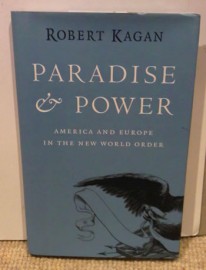
A review of “Paradise and power: America and Europe in the new world order”, by Robert Kagan (Atlantic Books, 2003 £10)
Most reviews of Robert Kagan’s brief yet seminal analysis of transatlantic relations occurred just before the Anglo-American intervention in Iraq. In consequence, they predominantly focused upon the military dimension of such relations. Being done whilst the politically inept consequences of the military intervention are in the process of revealing themselves, this review finds itself focusing upon the global balance-of-power ramifications whilst observing the processes of that political ineptitude taking place.
Crudely, Kagan’s thesis is that, whereas the American Mars clings to military power as its ultimate political tool, the European Venus rejects it as such. The United States relies on coercion; Europe relies on persuasion. Valid from the perspective of the twentieth-century, the thesis is questionable, not least from a longer term historical perspective. Nevertheless, in strictly twentieth-century, cold-war terms, the thesis has apparent viability. Pinpointing Western Europe’s dependency upon the United States nuclear umbrella during the cold-war era, the thesis explains the European political establishment’s psychological dependency upon the US that perpetuates itself into the post-cold-war era.
Kagan perceives the 1990s Balkans crises as a missed watershed in transatlantic relations. These crises provided Europe with the opportunity to gain its independence that it failed to grasp. As Kagan observes:
‘The Nato alliance appeared to have found a new, post-cold-war mission in bringing peace to that part of the Continent still prone to violent ethnic conflict….The enlargement of the Nato alliance to include former members of the Soviet block…..was another grand project that kept Europe in the forefront of American political and strategic thinking.’
An accurate summary of the perceptions underlying the European political establishment’s psychological dependency upon Washington, this observation embarrassingly also encapsulates the collective response of Euro-federalists to the Balkans fiasco as well as their illogical acceptance of Nato’s enlargement. Thus, questionable though Kagan’s basic thesis is, his analysis highlights schizophrenia within the emerging, broader spectrum of collective European political psyche that prevents it from asserting its political will to the fullest extent that geo-political logic dictates.
By highlighting this schizophrenia, Kagan doesn’t so much pinpoint its causes as illustrate its symptoms. The most obvious symptom was the European acceptance of the Clinton Administration’s conduct of Nato’s intervention in Kosovo. Rather than being implemented through the use of massive ground troops, maximising the use of explicitly political means to achieve the required solution within the territory, it was an intervention implemented predominantly by the use of air strikes. In terms of American domestic politics, this made complete sense; in terms of the crisis’s impact upon European civil society, it merely generated chaos. In other words, Nato’s intervention in Kosovo was symptomatic of Europe prioritising transatlantic unity over European security.
To the extent that Kagan pinpoints the causes of this European political schizophrenia, he does so by arguing that American military presence in cold-war Europe acted as a stimulus for European political integration. This analysis reflects Kagan’s assumption that the cold war was as objective a phenomenon as possible, and that the American presence was therefore an objective necessity. The assumption ignores the second-world-war’s traumatic input into Europe’s drive towards political integration. In other words, it is an assumption that can just as easily seen as symptomatic of America’s psychological need for Europe. Given that Kagan served in the US State Department from 1984 to 1998, this has a personalised logic to it indeed.
Kagan’s commitment to Europe is a cold-war commitment to “The West” as a so-called objective political entity. Problem. If the objective viability of the cold war is questioned, which it legitimately can, so too can the objective viability of “The West” be questioned. Accepting the objective viability of the cold war in the final analysis, Kagan nevertheless questions “The West” as an objective term by questioning the geo-political logic of the cold-war for the sake of argument. Paraphrasing Kagan arguing against himself, he muses:
‘It was American economic strategy to raise up [post-second-world-war] economic competitors in Europe [despite itself being in a state of relative economic decline]. It was American military logic to risk nuclear attack upon its otherwise unthreatened homeland in order to deter both nuclear and conventional attacks on its European…allies.’
Removed from political convention, it is hard to deny that such musings are more convincing than Kagan’s genuine beliefs. This becomes the more so when the cold-war rationale of Atlanticism is placed in the context of the post-cold-war era.
In fact such musings are integral to Kagan’s analysis, concluding as he does that the hegemonic manifestations in current United States foreign policy are rooted in the historical development of the US itself. This makes both historical and psychological sense. Being a nation of immigrants, inherently insecure, such an analysis explains the compulsive element, that element seeking to dominate in order to compensate for an inner insecurity, which is a basic characteristic of US foreign policy.
Placing this conclusion in the context of the current transatlantic crisis over Iraq, Kagan predicts that, although there will be other transatlantic crises, they will be of lesser severity. Ignoring the pivotal issues concerning the future international order that the political aftermath of the Anglo-American military intervention in Iraq will inevitably pose, the prediction is quaintly American in seeking wish fulfilment. Seeking the same wish fulfilment as that of the European political establishment, the achievement of such a wish would prove fatal to prospects of an international order based on a democratic global balance-of-power.
This article was contributed by John Williams, member of the Federal Union committee, who may be contacted at [email protected]. The opinions expressed at those of the author and not necessarily those of Federal Union.
More information
